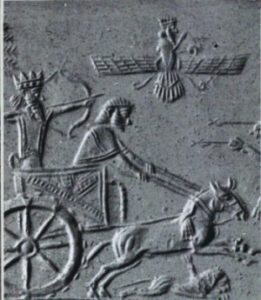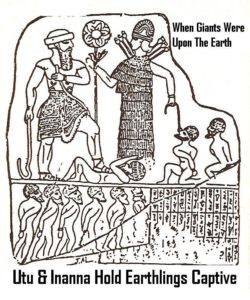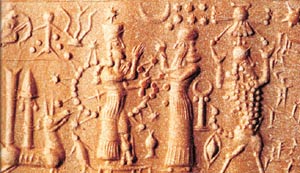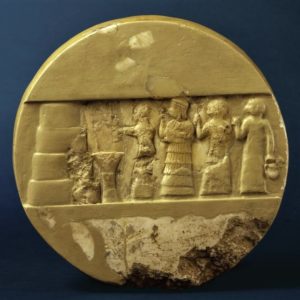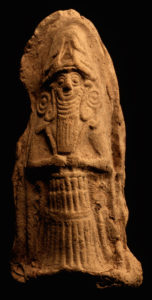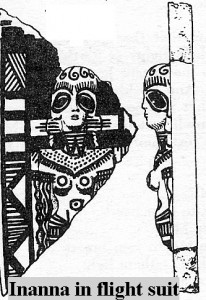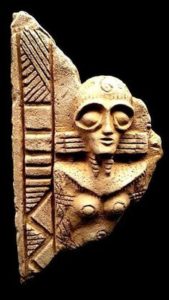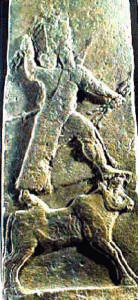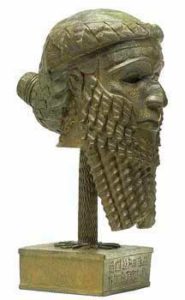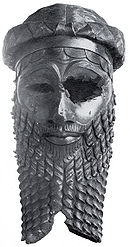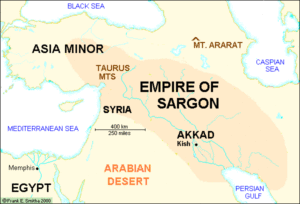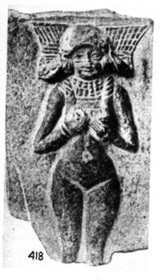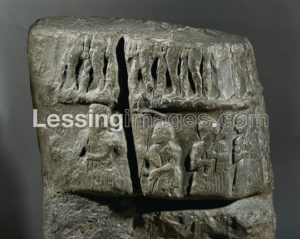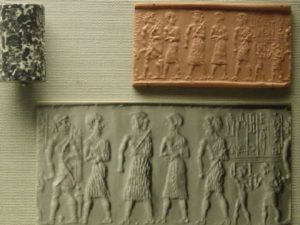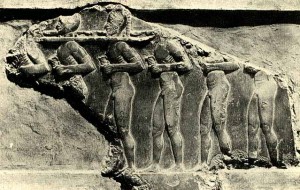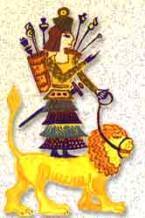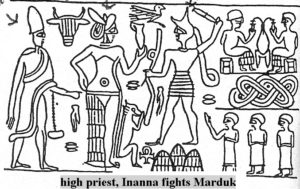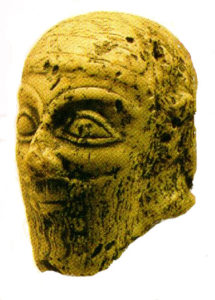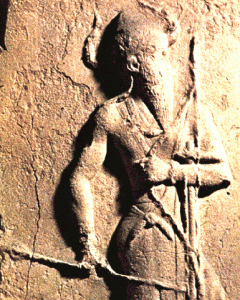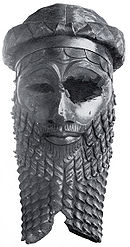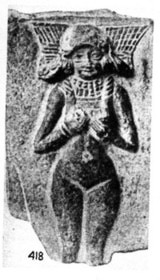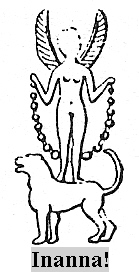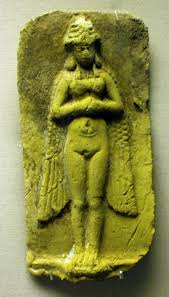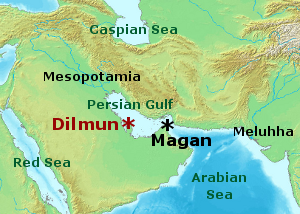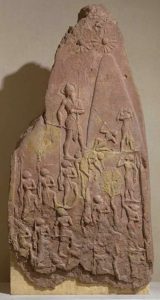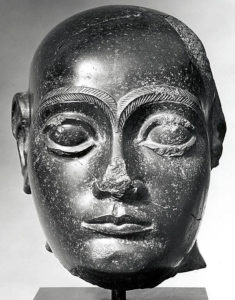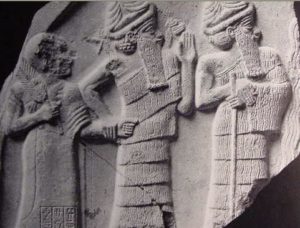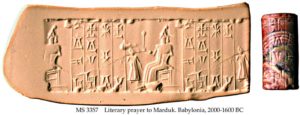(Texts: All Artifacts, Color Coding, & Writings in Bold Type With Italics Inside Parenthesis, are Added by Editor R. Brown, not the Authors, Translators, or Publishers!)
(gods in blue …mixed-breed demigods in teal…)
|
“Naram-Sin, son of Sargon, marched to Apišal. |
|
He made a breach in the city wall and Riš-Adad |
|
he captured, the king of Apišal, and the vizier of Apišal. |
|
He marched to Magan and captured Mannu-dannu, king of Magan…” |
Naram-Sin explains in this tale of woe that his troubles began when the goddess Ishtar “changed her plan” and the gods gave their blessing to “seven kings, brothers, glorious and noble; their troops numbered 360,000.” … Naram-Sin asked the gods what to do and was told to put aside his weapons and, instead of going to battle, to go sleep with his wife (but for some deep reason, avoid making love):
The gods reply to him:
“O Naram-Sin, this is our word:
This army against you…
Bind your weapons, in a corner place them!
Hold back your boldness, stay at home!
Together with your wife, in bed go sleep, but with her you must not…
Out of your land, unto the army, you must not go…”
But Naram-Sin, announcing that he would rely on his own weapons, decided to attack the enemy in spite of the gods’ advice.
“When the first year arrived, I sent out 120,000 troops,
but none of them returned alive…”
Naram-Sin confessed in his inscription. More troops were annihilated in the second and third years, and Akkad was succumbing to death and hunger. On the fourth anniversary of the unauthorized war, Naram-Sin appealed to the god Ea (Enki) to overrule Ishtar (Inanna) and put his case before the other gods. They advised him to desist from further fighting, promising that
“in days to come, Enlil will summon perdition upon the Sons of Evil,…”
and Akkad would have respite. The promised era of peace lasted about three centuries…
Sargon had not dared cross the forbidden line. But Naram-Sin, encouraged by Inanna, did…not only did Naram-Sin enter the peninsula, but he had gone on to invade the land of Magan.
“Naram-Sin, offspring of Sargon, marched against the town of Apishal
and made a breach in its wall, conquering it.
He personally caught Rish-Adad, king of Apishal, and the vizier of Apishal.
He then marched against the country of Magan
and personally caught Mannu-Dannu, king of Magan,…”
passage of a human king and a human army through the Sinai Peninsula, the gods’ own Fourth Region!…Naram-Sin began to call himself:
“Naram-Sin, King of the Four Regions;
vase of the Shining Crown of the land of Magan…”
The recognition by Naram-Sin of Nergal’s power and influence well beyond Africa…
“Although since the era of the rulership of man
none of the kings ever destroyed Arman and Ebla,
Now did the god Nergal open up the path for the mighty Naram-Sin.
He gave him Arma and Ebla, presented him with the Amanus
and with the Cedar Mountain and with the Upper Sea…”
Written on a statue:
“Naram-Sin, the mighty one, the king of Akkad.
When the four regions (of the world) revolted against him as one,
by the love which Ishtar (Inanna) showed him,
he was victorious in nine battles in one year
and captured those kings who had risen up (against him).
Because he forfeited the foundations of his city, which was in the line of danger
(the residents of) his city asked of Ishtar in the Eanna (Uruk),
of Enlil in Nippur, of Dagan (Ninurta in this case) in Tuttul,
of Ninhursag in Kish, of Enki in Eridu, of Sin in Ur, of Shamash in Sippar, …”
“The Curse of Agade ”chronicled…that Inanna had indeed gotten out of hand, “the word of the Ekur” (Enlil’s sacred precinct) was issued against her. But Inanna…forsook her temple and escaped from Agade:
“The ‘word of Ekur’ was upon Agade like a deadly silence;
Agade was all atremble, its Ulmash temple was in terror;
She who lived there, left the city.
The maiden forsook her chamber;
Holy Inanna forsook her shrine in Agade…”
The great gods arrived in Agade, they only found an empty temple; all they could do is strip the place of its attributes:
“In days not five, in day not ten,
The crownband of lordship, the tiara of Kingship,
the throne given to rulership Ninurta brought over to his temple;
Utu carried off the city’s ‘Eloquence’;
Enki withdrew its ‘Wisdom.’
Its Awesomeness that could reach the Heaven,
Anu brought up to the midst of Heaven…”
“The kingship of Agade was prostrated, its future was extremely unhappy…”
Then
“Naram-Sin had a vision,
He kept it to himself, put it not in speech, spoke with nobody about it…
Seven years Naram-Sin remained in wait…”
A text whose ancient title was “Queen of All the ME” acknowledges that Inanna had indeed, deliberately, decided to defy the authority of Anu and Enlil…and declared herself the Supreme Deity, a “Great Queen of Queens.” Announcing that she
“has become greater than the mother who gave birth to her…
even greater than Anu…”
…in Erech, aiming to dismantle this symbol of Anu’s authority:
“The heavenly kingship was seized by a female…
She changed altogether the rules of Holy Anu,
Feared not the great Anu.
She seized the E.Anna (temple – residence in Uruk) from Anu—
that House of irresistible charm, enduring allure–
On that House she brought destruction;
Inanna assaults its people, makes them captive…”
The coup…against Anu was accompanied by a parallel attack on Enlil’s seat and symbols of authority. This task was assigned by Inanna to Naram-Sin. Upon receiving his new orders:
“He defiled the word of Enlil,
Crushed those who had served Enlil,
Mobilized his troops, and
Like a hero accustomed to high-handedness
Put a restraining hand on the Ekur.
Like a bandit he plundered it…”
“Erecting large ladders against the House,…”
smashing his way in, he entered its Holy of Holies:
“the people now saw its sacred cella, a chamber that knew not light;
the Akkadians saw the holy vessels of the god…”
Naram-Sin
“cast them into the fire, docked large boats at the quay by the House of Enlil,
and carried off the possessions of the city…”
The horrible sacrilege was complete…Enlil “lifted his eyes”…”Because his beloved Ekur had been attacked”, he ordered the hordes of Gutium—a mountainland to the northeast of Mesopotamia—to attack Akkad and lay it waste. They came down upon Akkad and its cities
“in vast numbers, like locusts…nothing escaped their arm…”
1500 years later, the WeidnerChronicle (ABC 19) accounts for the Gutian period as follows:
“Naram–Sin destroyed the people of Babylon,
so twice Marduk summoned the forces of Gutium against him…”
Marduk gave his kingship to the Gutian force.
“The Gutians were unhappy people unaware how to revere the gods,
ignorant of the right cultic practices.
Utu–hengal, the fisherman, caught a fish at the edge of the sea for an offering.
That fish should not be offered to another god
until it had been offered to Marduk,
but the Gutians took the boiled fish from his hand before it was offered,
so by his august command, Marduk removed the Gutian force
from the rule of his land and gave it to Utu-hengal…”
The fall of Akkad was due to Naram-Suen‘s attack upon the city of Nippur. When prompted by a pair of inauspicious oracles from Inanna, the king sacked the E-kur temple, the House of Enlil. As a result of this, eight chief deities of the Anunaki pantheon came together and withdrew their support from Akkad.
“For the first time since cities were built and founded,
The great agricultural tracts produced no grain,
The inundated tracts produced no fish,
The irrigated orchards produced neither wine nor syrup,
The gathered clouds did not rain, the masgurum did not grow.
At that time, one shekel’s worth of oil was only one-half quart,
One shekel’s worth of grain was only one-half quart. . . .
These sold at such prices in the markets of all the cities!
He who slept on the roof, died on the roof,
He who slept in the house, had no burial,
People were flailing at themselves from hunger.
Heads were crushed, mouths were crushed…
the blood of the treacherous flowed over the blood of the faithful…”
“the city who dared assault the Ekur…”
“curse Agade with a baleful curse…”
“And lo, so it came to pass…Agade is destroyed…”
Agade forever remained desolate.
